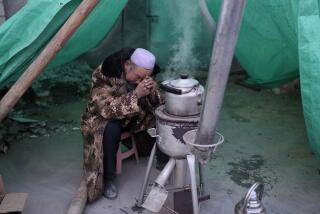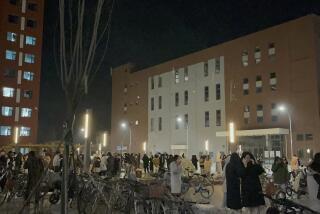New China appears amid quake rubble
- Share via
BEIJING — One month after a massive earthquake killed nearly 70,000 people, some of the effects of the crisis may hardly outlast the rubble, even as other seismic shifts irrevocably shake the Chinese government and society.
The cooperative response of local government officials to the quake will probably be short-lived, analysts said, as corruption and a sense of entitlement resurge just as billions of dollars flow into Sichuan province for reconstruction.
One lasting change, however, is the prominent focus in recent weeks on the individual in a culture that has long emphasized collectivism. The tone was set by Premier Wen Jiabao’s personal attention to victims in the wreckage and his well-publicized reminder that the army’s first responsibility was to the public, not the other way around. “It is the people who are feeding you,” he reportedly said.
“The value put on human life and ‘people-centered’ themes became real,” said Cheng Li, a senior fellow with the Brookings Institution. “That’s a fundamental change.”
Round-the-clock television coverage during the first few weeks highlighted the plight of ordinary Chinese, images interspersed with emotional narratives and family stories. This is heady stuff for a society weaned on production figures and boring news clips of its leaders on factory tours.
Although China has been moving away from collectivism for years, much of the personal expression until now has been directed at consumer choice: beauty treatments, buying condos, owning more stocks.
Watching the outpouring of empathy and sacrifice by well-dressed young urbanites, older Chinese have heaved a collective sigh of relief, their concern blunted that the younger generation was selfish and lacked social awareness.
“While the primary focus for this generation is still on themselves, making money and pursuing their careers, the crisis has also revealed another side,” said Li Lulu, a sociologist at People’s University in Beijing. “It’s showed they are also concerned with society and the nation.”
Another change that appears to be durable, analysts said, is the government’s willingness to allow foreign humanitarian aid workers, even foreign soldiers, on Chinese soil. Ostensibly a small step, it suggests a more confident nation able to accept assistance without viewing it as a threat to sovereignty and national pride.
Also significant, some add, is a more pronounced sense of national identity seen in the earthquake’s wake. This has reinforced a sense of unity -- “We Chinese” is now frequently heard.
This contrasts with past outbursts of nationalism that tended to carry a sharper edge, as seen directed against the United States after the North Atlantic Treaty Organization’s mistaken bombing in 1999 of the Chinese Embassy in Belgrade, capital of the then-Yugoslavia, or even this year, against foreigners and overseas media after pro-Tibet protests disrupted the Olympic torch relay ahead of the Summer Games in Beijing.
This sense of collective identity could lead to gradual political reform -- “We Chinese” deserve a less corrupt system and school construction that won’t so easily buckle in an earthquake. But it also could lead to a strengthening of the status quo, analysts said -- “We Chinese” shouldn’t change our Communist government since it responded so well.
“It’s complicated and the direction isn’t clear,” said Xiao Qiang, head of the China Internet Project at UC Berkeley. “But what is clear is that there’s much more ‘We Chinese’ this and ‘We Chinese’ that.”
Other lasting, if slower-brewing, changes include more pronounced demands for government accountability, albeit within limits.
“In the first two weeks, it was all about touching media stories. But then people started asking more tough questions about poor construction standards, the government’s slow response and the lack of advance warning,” said Joseph Cheng, a political scientist at the City University of Hong Kong. “It’s no longer possible in such a large disaster to stop people from asking questions.”
But few expect those questions to change how local governments respond to citizen complaints.
“This will most likely go back to business as usual after the attention of the central government and the press shift elsewhere,” said Minxin Pei, director of the China program at the Carnegie Endowment for International Peace in Washington.
Experts also said they expected little lasting accountability of the donations and overseas aid, despite official calls for transparency and an end to corruption. By June 11, China had received $6.4 billion from donors here and abroad.
Beijing continues to face great anger from parents whose children died in the rubble of collapsed schools even as many neighboring buildings appeared to weather the temblor relatively intact.
“This is a perilous issue if not handled well,” said Wenran Jiang, a professor at Canada’s University of Alberta.
“These parents represent an extremely powerful force. They’re looking for responsibility.”
This has led to calls at home and abroad for a thorough investigation of shoddy construction, including a close look at whether local officials pocketed funds that should have gone into steel reinforcements and better cement.
“We will wait for the investigation,” said Chen Xuefen, 32, who lost her son, Jing Chung, 11, in the collapse of his elementary school. “If these are not satisfactory, we’ll go to court. We no longer trust the local government.”
How the government reacts in the coming months on this sensitive issue will tell a lot about China’s political modernization, analysts said.
Premier Wen and the central government have built up a large reserve of goodwill with their rapid and generally effective response to the earthquake. This puts them in an ideal position to demand answers from local governments about shoddy construction and accountability, which, some said, would give real meaning to the administration’s “people first” slogan.
“The thing about the communist system is, they can get this done,” said Ying Chan, journalism school dean at Shantou University in the southeastern province of Guangdong. “They can order a work team and impound evidence if the government has the will.”
But several analysts said they doubted that the government would change its ways and fully investigate the problems. Ultimately it will probably pay off and intimidate parents, cover up the issue, selectively loosen one-child rules and fire a few token officials, they said.
Real reform is difficult because Beijing would have to fund local school construction, an expensive proposition. It would also mean a bigger watchdog role for civic society and the media as billions of dollars in reconstruction funds flow through local officials’ fingers.
“Under the existing political system and environment, I don’t expect there to be a lot of self-reflection by the government,” said Du Gangjian, dean of Shantou University’s law school and head of a team drafting a disaster relief law. “Until the party and the government operate according to the rule by law, I don’t expect much change.”
--
More to Read
Sign up for Essential California
The most important California stories and recommendations in your inbox every morning.
You may occasionally receive promotional content from the Los Angeles Times.













